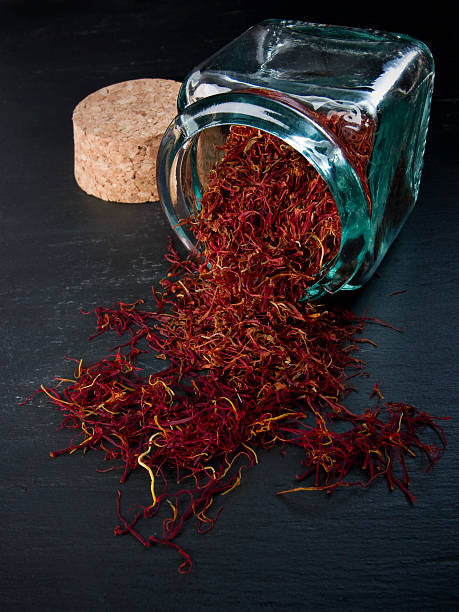Saffron has been used in perfumery and medicine for more than 3000 years

Saffron, a type of plant, is one of the most famous types of spices, which is widely used in preparing many types of food. It is an essential addition to it, and saffron is obtained from the stigmas of the flower and parts of the pens of the plant, which are plucked and dried. It is distinguished by its bright, bright color and yellow color. It is known by its scientific name saffron iris, which is also called the violet autumn saffron.
There are four main types of saffron, which we mention as follows:
Sargol: It is extracted from the tip of the saffron threads, and it has a strong smell, its color is red, and it is devoid of yellow and orange threads, and it is of high quality.
Negin: It has long threads, it is colored between yellow and orange, and it has a pleasant smell.
Super Negin: It is considered the best type of saffron, with long red threads, and free of orange or yellow threads.
Bushal: It is the cheapest type of saffron, and the most readily available in stores.

Nutritional value of saffron :

Saffron contains many vitamins, minerals, and antioxidants, and the following illustrates the nutritional value of saffron in a teaspoon, equivalent to 0.7 grams:
Calories: 2.17 calories.
Protein: 0.08 grams.
Fat: 0.041 grams.
Carbohydrates: 0.458 grams.
Dietary fiber: 0.027 grams.
Calcium: 0.777 mg.
Iron: 0.078mg.
Magnesium: 1.85 mg.
Phosphorous: 1.76 mg.
Potassium: 12.1 mg.
Sodium: 1.04 mg.
Benefits of saffron :
Saffron has many important medical and nutritional benefits, which make it an excellent addition to the diet, and its benefits are as follows: It gives food a distinctive and delicious flavor. It is used in coloring various foods and sweets, as a natural dye that does not contain any side effects.

- Treats respiratory diseases and infections.
- Relieves some irritating disorders, such as coughing.
- Relieves stomach and intestinal cramps.
- treats colds; Kalrh and scarlet fever, and the common cold. Relieves symptoms of allergic asthma.
- It relieves the feeling of insomnia, and helps to sleep deeply.
- Treats cardiovascular diseases. It resists the growth of cancerous tumors.
- Treats blood diseases and circulatory disorders.
Saffron side effects
The disadvantages of saffron are as follows:
Eating saffron in small nutritional quantities is relatively safe, however, it may cause some side effects, especially if it is used as a medicine for a long period of time (i.e., more than 6 months approximately), and these effects include the following:
- Allergic reactions in some people.
- vomiting or nausea.
- headache.
- dizziness.
- bad mood.



